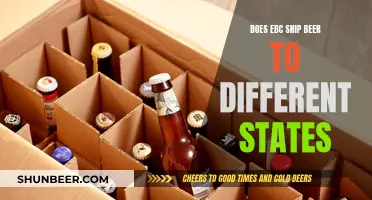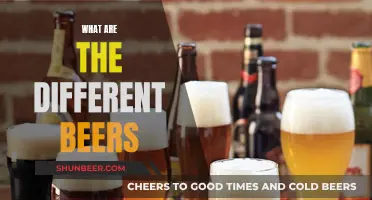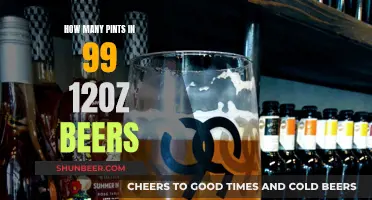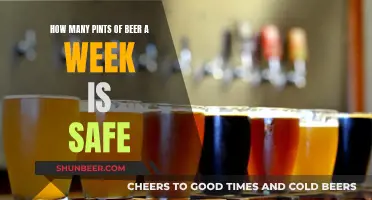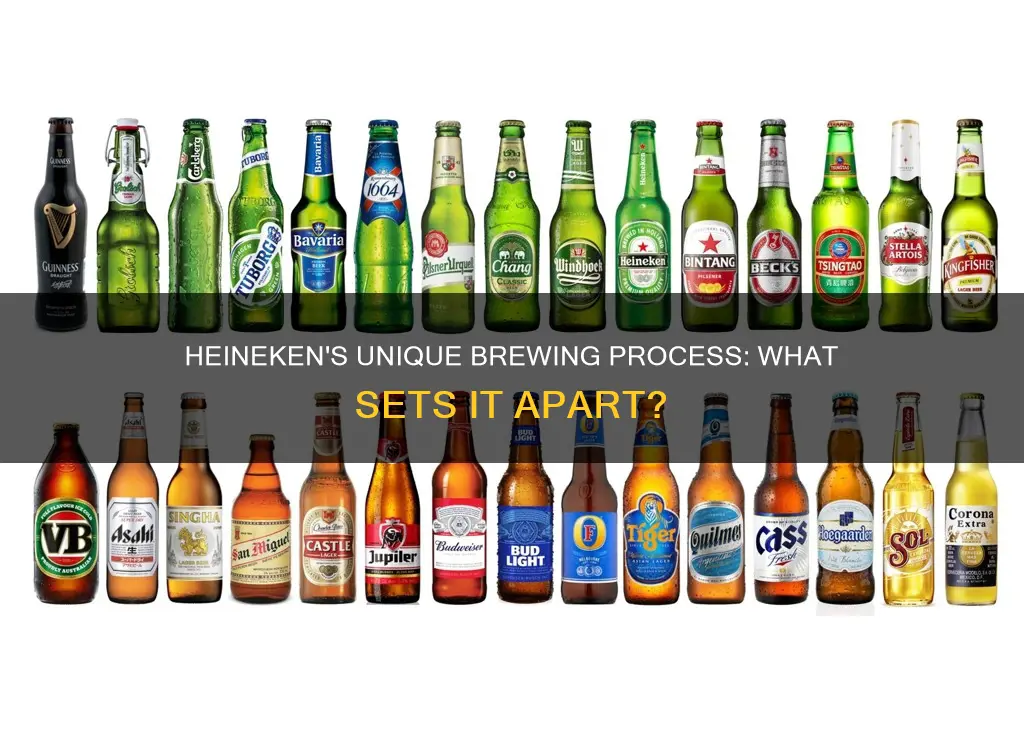
Heineken is a Dutch multinational brewing company, founded in 1864 by Gerard Adriaan Heineken in Amsterdam. It is the world's second-largest brewer, producing a portfolio of over 300 beers and ciders around the globe. The company has a wide range of subsidiaries, including Mexican, Jamaican, Haitian, Italian, English, Irish, Belgian, American, and Ecuadorian brands. Heineken's flagship product, Heineken Lager Beer, is a pale lager with 5% alcohol by volume. It is known for its iconic green bottle with a red star and has been sold in nearly 200 countries. The company has a long history of awards and sponsorships, with a focus on sustainability and social initiatives.
What You'll Learn

Heineken's global reach
In Europe, Heineken has a strong presence with 23 operating companies across the continent. These include well-known brands such as Amstel, Birra Moretti, and Affligem. Heineken has also expanded into the cider market by acquiring brands such as Strongbow and Bulmers.
In the Americas, Heineken has 9 operating companies and produces popular brands such as Tecate, Dos Equis, and Sol in Mexico, and Red Stripe in Jamaica. Heineken USA, established in 1946, was the first beer import to re-enter the US market after Prohibition.
Heineken has 15 operating companies in the Asia Pacific region, including in China, India, Indonesia, and Vietnam. The company has also expanded into the Middle East and Africa, with 18 operating companies in countries such as Egypt, Ethiopia, and South Africa.
Heineken's global expansion can be attributed to its devotion to marketing and branding, as well as its early focus on exports. The company has also been able to increase its stock price by purchasing competing breweries and has benefited from mergers and acquisitions.
In recent years, Heineken has continued to grow its global reach through various acquisitions and partnerships. In 2010, Heineken entered into a joint venture with Diageo to build a brewery in South Africa. In 2015, Heineken acquired a 50% stake in Lagunitas Brewing Company, a craft brewer in the US, and in 2017, it fully acquired the company. Heineken has also expanded its non-alcoholic offerings with the launch of Heineken 0.0 in 2017 and has sponsored various sporting events, including the UEFA Champions League and Formula One World Championship.
Beer Size Matters: How Larger Brews Differ
You may want to see also

Heineken's brand portfolio
Heineken N.V. is a Dutch multinational brewing company, founded in 1864 by Gerard Adriaan Heineken in Amsterdam. Heineken owns over 165 breweries in more than 70 countries and produces 348 international, regional, local and speciality beers and ciders. Heineken's brand portfolio includes:
Heineken Lager Beer
Also known as Heineken Pilsener, it is the company's flagship product. It is a 5% ABV pale lager that was first brewed in 1868. It is produced by 40 breweries in 39 countries around the world.
Heineken Premium Light
A low-calorie version of the flagship Heineken Lager Beer.
Buckler
A low-alcohol (0.5% ABV) pale lager launched in the summer of 1988. It was the beverage of choice for US President Joe Biden at the "Beer Summit".
Tecate
Tecate is one of Heineken's largest brands. It is a Mexican beer produced by Heineken.
Amstel
Amstel is another one of Heineken's largest brands. It is a Dutch beer that was founded in 1870 in Amsterdam. Heineken took over the Amstel brewery in 1968 and moved production to the main Heineken plant at Zoeterwoude. Amstel Lager is sold in 75 countries.
Birra Moretti
Birra Moretti is an Italian pale lager founded in Udine in 1859 by Luigi Moretti. Heineken acquired the company in 1996. There are eight beers under the Birra Moretti brand, including La Rossa, a 7.2% strong dark lager.
Affligem
Affligem is a Belgian brand that produces a range of beers, including Affligem Blonde, a 6.8% pale ale, and Affligem Dubbel, a 7% dubbel.
Sagres
Sagres is a Portuguese brand of beers produced by Sociedade Central de Cervejas (SCC). The Sagres brand was created in 1940 and is named after a town of the same name.
Cruzcampo
Cruzcampo is a Spanish beer with breweries in Seville, Madrid, Valencia, Jaén and Arano. It has been part of Heineken since it bought the brand from Guinness.
Tiger Beer
Tiger Beer is a Southeast Asian beer that is produced by Heineken.
Dos Equis, Sol, Bohemia, Carta Blanca, and Indio
These are Mexican beers that are produced by Heineken.
Red Stripe
Red Stripe is a Jamaican beer produced by Heineken.
Prestige
Prestige is a beer from Haiti that is produced by Heineken.
Newcastle Brown Ale
Newcastle Brown Ale is a U.K. beer produced by Heineken.
Murphy's Stout
Murphy's Stout is an Irish beer produced by Heineken.
Desperados
Desperados is a tequila-flavoured beer acquired by Heineken in 2012.
Strongbow
Strongbow is the world's top hard cider producer and is owned by Heineken.
Kingfisher
Kingfisher is an Asian-Pacific beer distributed by Heineken.
Bintang
Bintang is an Asian-Pacific beer distributed by Heineken.
South Pacific Export
South Pacific Export is an Asian-Pacific beer distributed by Heineken.
Edelweiss, Lagunitas, and Sol
These are international brands owned by Heineken.
IPA Beer: Unique Effects and Experiences
You may want to see also

Heineken's Dutch origins
Heineken is a Dutch pale lager beer with 5% alcohol by volume. It was founded in 1864 by Gerard Adriaan Heineken, who purchased and renamed Amsterdam's De Hooiberg brewery, in operation since 1592. Heineken is now the world's second-largest brewer, with a portfolio of over 300 beers and ciders and operations in more than 70 countries. The company has its roots in the Netherlands, where Gerard Adriaan Heineken bought the De Hooiberg (The Haystack) brewery on the Nieuwezijds Achterburgwal canal in Amsterdam. This popular working-class brand had been founded in 1592.
In the early years of Heineken, the beer won several awards, including the Medaille d'Or at the International Maritime Exhibition in Paris in 1875 and the Grand Prix at the Exposition Universelle in Paris in 1889. These awards are still mentioned on the label today.
In 1873, Gerard Adriaan Heineken hired Dr Elion, a student of French chemist Louis Pasteur, to develop a yeast for Bavarian bottom fermentation. This led to the establishment of the Heineken's Bierbrouwerij Maatschappij (HBM) and the brewing of the first Heineken brand beer.
In 1886, Dr H. Elion developed the "Heineken A-yeast" in the Heineken laboratory, which remains a key ingredient in Heineken beer today.
In the late 19th and early 20th centuries, Heineken expanded its operations, opening a second brewery in Rotterdam in 1874 and switching to bottom-fermenting yeast in 1869. The company continued to focus on exports, particularly to France, where it became the biggest beer exporter after winning the Medaille d'Or in 1875.
In 1975, Heineken moved its production from Amsterdam to Zoeterwoude, in South Holland, where most Heineken-brand beer is still brewed today. The original brewery in Amsterdam was closed in 1988 but has been preserved as a museum called the Heineken Experience.
Explore the Difference Between Ales and Lagers in Beer
You may want to see also

Heineken's green bottles
Heineken has been brewed for over 150 years and is the second-largest brewer in the world, with a portfolio of over 300 beers and ciders. The company has subsidiaries in Mexico, Jamaica, Haiti, Italy, England, Ireland, Belgium, the US, and Ecuador. Heineken's flagship product, Heineken Lager Beer, is a 5% ABV pale lager that was first brewed in 1868. It is sold in a green bottle with a red star.
The Heineken bottle is iconic and has been a key part of the brand's success. In 2013, the company celebrated its 140th anniversary with a bottle design challenge, inviting fans to remix the bottle using images from the brand's past. The result was a modern and sleek design that would look at home in trendy clubs and bars. The green colour of the bottle is particularly notable, and Heineken has stuck with this shade over alternatives of clear or brown glass. The brewer knew that the appearance of the bottle created a lasting impression, and while clear bottles showcase the colour and texture of the beer, green has historically been associated with high-quality beer.
After World War II, there was a shortage of brown glass, so European brewers exported their beers in green bottles. Many of these beers were extremely high-quality, and the green bottle became a symbol of great beer. Additionally, market research revealed that women in the US might prefer the green colour.
However, the green glass is not without its drawbacks. It is well-known that green glass bottles can cause beer to develop a "skunky" or "light-struck" flavour due to a reaction with UV light. This is why beers like Heineken and Beck's, which are bottled in green glass, are more prone to this issue. Despite this, Heineken has continued to use green bottles, prioritising branding and marketing over this potential issue.
In 2013, Heineken made a change to its bottle design, introducing a slimmer green bottle with a longer neck. This new bottle is 1.25 inches taller than the old one, with a longer and narrower neck that gives it a more modern look. The brewer believed that this design would help attract new, younger drinkers. The bottle also features a thumb groove to improve grip and encourage drinkers to hold the bottle lower, keeping the beer colder. Additionally, the strong shoulder of the bottle conveys an air of "masculinity and pride," according to Heineken.
EBC Beer Shipping: State-by-State Availability and Restrictions
You may want to see also

Heineken's sponsorships
Heineken has been a sponsor of numerous sporting events and organisations. Heineken has been a sponsor of the UEFA Champions League since 1994, and became the official beer of Major League Soccer (MLS) in 2014. Heineken has also been a sponsor of the UEFA Europa League and UEFA Europa Conference League through its Heineken 0.0 brand. Heineken was also the major sponsor of the UEFA Super Cup, the UEFA Euro, and the Rugby World Cup. Heineken's rugby sponsorships also include the European Champions Cup, which was renamed the 'Heineken Champions Cup' in 2018. Heineken has also been a sponsor of Rugby Union in Wales, with the Welsh Premier Division competition. In 2016, Heineken became the Official Beer of the FIA Formula One World Championship. In August 2021, Heineken signed a multi-year deal with the W Series as a global partner for the all-women single-seater racing series.
In addition to sports sponsorships, Heineken has also partnered with retail brands to create limited-edition, co-branded products. For example, in 2018, Heineken partnered with Italian sportswear brand Kappa's U.S. division to create a six-piece capsule collection that included a tracksuit and jersey set. Heineken has also collaborated with A Bathing Ape and other brands as part of its #Heineken100 campaign.
Vodka vs Beer: Different Drunk Feels
You may want to see also
Frequently asked questions
Heineken is a Dutch multinational brewing company, founded in 1864 by Gerard Adriaan Heineken in Amsterdam. Heineken is the world's second-largest brewer and produces a portfolio of more than 300 beers and ciders around the globe. Heineken's flagship product, Heineken Lager Beer, is a 5% ABV pale lager that has been brewed for more than 150 years.
Heineken owns a worldwide portfolio of over 170 beer brands, including Amstel, Birra Moretti, Desperados, Tiger, Tecate, Dos Equis, Sol, and many more.
Heineken is sold in 192 countries and is available in nearly 200 countries. It is the number one brewer in Europe and one of the largest brewers by volume in the world.


